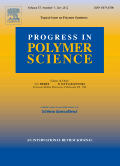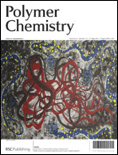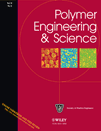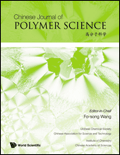
PROGRESS IN POLYMER SCIENCE
Scope & Guideline
Transforming Theoretical Insights into Practical Solutions
Introduction
Aims and Scopes
- Innovative Polymer Synthesis:
The journal showcases research on novel synthesis techniques for polymers, including controlled radical polymerization, photopolymerization, and bio-based polymer synthesis, emphasizing the importance of precision and sustainability in polymer chemistry. - Functional and Smart Polymers:
Research articles explore the development of functional polymers with specialized properties, such as stimuli-responsiveness, self-healing, and bioactivity, which are crucial for applications in biomedical devices, sensors, and energy storage. - Polymer Nanocomposites:
The focus on polymer nanocomposites highlights the integration of nanoparticles to enhance mechanical, thermal, and electrical properties, aimed at applications in packaging, electronics, and environmental technology. - Sustainable and Biodegradable Materials:
The journal prioritizes studies on sustainable polymers and biodegradable options, such as polyhydroxyalkanoates and bio-sourced materials, addressing the global need for environmentally friendly materials. - Polymer Applications in Energy and Electronics:
Research on the application of polymers in energy storage, organic electronics, and photonic devices showcases the role of polymers in advancing technology for sustainable energy solutions.
Trending and Emerging
- Biodegradable and Biobased Polymers:
There is a marked increase in research focused on biodegradable and biobased polymers, highlighting the urgency for sustainable materials that reduce environmental impact and align with circular economy principles. - Smart and Responsive Polymers:
Emerging themes include the development of smart polymers that respond to environmental stimuli, such as temperature and pH changes, which are critical for applications in drug delivery and adaptive materials. - Machine Learning and Polymer Design:
The integration of machine learning techniques in polymer design and characterization is gaining traction, indicating a trend towards data-driven approaches that enhance the efficiency and precision of polymer development. - Advanced Polymer Composites:
Research on advanced polymer composites, particularly those incorporating two-dimensional materials like MXenes and graphene, is on the rise, reflecting interest in enhancing material performance for high-tech applications. - Energy Storage and Conversion Technologies:
There is a growing focus on the use of polymers in energy storage and conversion technologies, including batteries and solar cells, which is essential for advancing sustainable energy solutions.
Declining or Waning
- Traditional Polymer Characterization Techniques:
There has been a noticeable decline in papers focused exclusively on traditional polymer characterization methods, as the field shifts towards integrating advanced characterization techniques alongside synthesis and application studies. - Conventional Thermoplastics:
Research on conventional thermoplastics seems to be waning, likely due to a growing emphasis on innovative materials and environmentally sustainable alternatives that address the shortcomings of traditional plastics. - Basic Polymer Chemistry:
The focus on fundamental polymer chemistry topics appears to be decreasing as the journal increasingly prioritizes applications and interdisciplinary approaches, reflecting a trend towards more applied research.
Similar Journals

Polymer Chemistry
Exploring Innovative Solutions in Polymer ChemistryPolymer Chemistry is a premier peer-reviewed journal published by the Royal Society of Chemistry, focusing on cutting-edge research and developments in the field of polymer science. With its ISSN 1759-9954 and E-ISSN 1759-9962, this journal has established a significant impact within the academic community, as evidenced by its impressive Q1 ranking in areas such as Biomedical Engineering, Organic Chemistry, and Polymers and Plastics. Over its convergence period from 2010 to 2024, Polymer Chemistry has become an essential resource for researchers, professionals, and students, showcasing innovative studies that advance the understanding of polymer behavior and applications. The journal does not currently offer open access, allowing for a traditional but rigorous peer-review process ensuring high-quality publications. For those engaged in the rapidly evolving disciplines of biochemistry and bioengineering, Polymer Chemistry serves as a vital platform for disseminating influential findings and fostering interdisciplinary collaboration in a global context.

MACROMOLECULAR RESEARCH
Leading the Charge in Macromolecular ResearchMACROMOLECULAR RESEARCH, published by the POLYMER SOC KOREA, is a premier journal dedicated to advancing the field of macromolecular science and polymer engineering. With its ISSN 1598-5032 and E-ISSN 2092-7673, this journal has emerged as a vital platform for researchers and professionals interested in the application and development of polymers across various domains. Based in South Korea and operating as an open-access resource since its inception in 2002, MACROMOLECULAR RESEARCH consistently ranks in the Q2 category across diverse fields such as Chemical Engineering, Materials Chemistry, and Organic Chemistry as per the latest 2023 metrics. Notably, it is recognized for its substantial contributions to polymery science, increasing its visibility and impact in global research. By providing a forum for original research articles, reviews, and innovative methodologies, this journal aims to foster collaboration and knowledge sharing among scientists, engineers, and students alike. Join a community that is at the forefront of polymer research by exploring the wealth of resources and cutting-edge studies featured in MACROMOLECULAR RESEARCH.

POLYMERS & POLYMER COMPOSITES
Unveiling Breakthroughs in Material SciencePOLYMERS & POLYMER COMPOSITES, published by SAGE Publications Ltd, is a prestigious journal dedicated to the exploration of significant advancements in the diverse fields of polymers, composite materials, and their innovative applications. With an ISSN of 0967-3911 and E-ISSN of 1478-2391, this journal plays a crucial role in the academic community, boasting an impressive ranking in the Q2 quartile across pivotal categories such as Ceramics and Composites, Materials Chemistry, and Polymers and Plastics in 2023. Positioned in the United Kingdom, it serves as a vital resource for researchers and professionals, providing insights into current trends and future directions in material science. Despite its availability not extending to Open Access, the journal aims to promote rigorous peer-reviewed research, thus fostering knowledge and collaboration among scholars. With publication convergence from 1993 to 2024, POLYMERS & POLYMER COMPOSITES stands as a cornerstone for those pursuing advanced understanding and excellence in material innovation.

POLYMER ENGINEERING AND SCIENCE
Pioneering Research in Polymer ApplicationsPOLYMER ENGINEERING AND SCIENCE, published by WILEY, is a premier journal specializing in the field of polymer science and engineering. Since its inception in 1961, this journal has been at the forefront of disseminating high-quality research, focusing on various aspects of polymers and plastics, including their chemistry, properties, and applications. With an impressive impact factor, it ranks in the second quartile (Q2) across multiple categories, including Chemistry (Miscellaneous), Materials Chemistry, and Polymers and Plastics, showcasing the journal's significance and influence in these vital areas of research. Researchers and professionals in academia and industry will find the latest advancements and innovative methodologies in polymer science, making this journal an essential resource for those looking to stay updated on cutting-edge developments. While it does not currently support Open Access, its comprehensive scope and critical insights positioned it as a valuable platform for advancing knowledge and fostering collaboration within the polymer community. The journal’s office is located at 111 River St, Hoboken 07030-5774, NJ, United States, emphasizing its strong presence in the academic landscape.

ACTA POLYMERICA SINICA
Fostering Interdisciplinary Collaboration in Material ScienceACTA POLYMERICA SINICA is a distinguished journal published by SCIENCE PRESS, specializing in the multifaceted disciplines of Chemical Engineering, Chemistry, and Polymers and Plastics. Established in 1996, this peer-reviewed journal provides a critical platform for the dissemination of cutting-edge research and advancements within these fields, promoting innovation and knowledge-sharing among researchers and professionals globally. With its presence in the highly competitive Q3 quartile rankings as of 2023, the journal demonstrates a commitment to maintaining rigorous academic standards while supporting the evolving landscape of polymer science. Operating from Beijing, China, the journal caters to a broad readership and emphasizes the importance of interdisciplinary collaboration in addressing contemporary challenges in material science. Although it does not offer open access, ACTA POLYMERICA SINICA remains a vital resource for scholars seeking to enhance their understanding and contribute valuable insights to the field.

CHINESE JOURNAL OF POLYMER SCIENCE
Innovative Research at the Forefront of Polymer ScienceThe CHINESE JOURNAL OF POLYMER SCIENCE, published by SPRINGER, stands as a premier periodical in the realm of polymer science, showcasing cutting-edge research and technological advancements since its inception in 1985. With an impressive impact factor reflecting its significance in the field, this journal is categorized in the top quartiles (Q1) of Chemical Engineering, Organic Chemistry, and Polymers and Plastics. It features a wide spectrum of innovative studies, thus serving as an essential resource for researchers, professionals, and students dedicated to understanding and advancing polymer-related technologies. The journal is indexed in Scopus, with notable rankings that highlight its influence in the disciplines of organic chemistry and materials science, making it a vital communication platform for authors around the globe aiming to disseminate impactful findings. Although not an open-access publication, the journal ensures robust accessibility through institutional subscriptions and partnerships, further emphasizing its commitment to the advancement of polymer science.

Express Polymer Letters
Pioneering Insights in Polymer EngineeringExpress Polymer Letters is a leading open-access journal published by BUDAPEST UNIVERSITY OF TECHNOLOGY AND ECONOMICS, focusing on the fast-paced realm of polymer science and engineering. With a broad scope that encompasses the interdisciplinary fields of Chemical Engineering, Materials Chemistry, and Organic Chemistry, the journal serves as a crucial platform for researchers and professionals dedicated to advancing knowledge and innovation in polymer-related disciplines. Since its inception in 2007, it has consistently provided high-quality, peer-reviewed research and has achieved a respectable impact within various categories, evidenced by its Q2 quartile rankings across multiple Scopus categories and its competitive standings in the field. The journal's dedication to open access ensures that research is widely disseminated, promoting transparency and collaboration within the academic community. Positioned to converge into the future, Express Polymer Letters remains an essential resource for cutting-edge studies and developments, with an anticipated convergence period extending through 2024.

POLYMER BULLETIN
Pioneering Discoveries in Condensed Matter PhysicsPOLYMER BULLETIN is a prominent journal in the field of polymer science, published by SPRINGER in Germany. Established in 1978, this peer-reviewed journal focuses on the latest research and developments in polymer chemistry, materials science, and condensed matter physics, boasting a commendable impact factor indicative of its rigorous academic standards. With a Q2 ranking in multiple categories including Chemistry (Miscellaneous), Condensed Matter Physics, Materials Chemistry, and Polymers and Plastics, POLYMER BULLETIN serves as an essential resource for researchers, professionals, and students aiming to stay abreast of innovative findings and methodologies within these interdisciplinary landscapes. Although the journal does not currently offer open access, it provides invaluable insights and data that significantly contribute to the advancement of polymer science. For more information and to access published articles, visit the journal's page on the Springer website.

INTERNATIONAL JOURNAL OF POLYMER ANALYSIS AND CHARACTERIZATION
Exploring innovative methodologies in polymer characterization.International Journal of Polymer Analysis and Characterization is a distinguished scholarly publication dedicated to the field of polymer science, with a focus on innovative methodologies and significant advances in the analysis and characterization of polymeric materials. Published by Taylor & Francis Ltd in the United Kingdom, this journal serves as a vital resource for researchers, professionals, and students deeply engaged in Analytical Chemistry, Chemical Engineering, and Polymer Science. With a convergence spanning from 1995 to 2024, it holds a Q3 ranking in the 2023 category quartiles for its valuable contributions to the fields of Analytical Chemistry, Chemical Engineering, and Polymers and Plastics. Despite being a non-open access publication, its rigorous peer-review process and comprehensive coverage of current trends ensure that the journal remains a crucial platform for disseminating impactful research. The journal is indexed in various databases, underscoring its relevance and quality in the academic community. Exploratory studies and articles that push the boundaries of polymer analysis find a welcoming home within these pages, making it an essential read for those aiming to stay at the forefront of polymer research.

POLYMER SCIENCE SERIES A
Advancing Polymer Knowledge, One Article at a TimePOLYMER SCIENCE SERIES A is a distinguished journal dedicated to the field of polymer science, with a focus on advancing knowledge in materials chemistry and polymers and plastics. Published by MAIK NAUKA/INTERPERIODICA/SPRINGER, this journal provides a platform for researchers and practitioners to disseminate their findings and innovations. With an ISSN of 0965-545X and an E-ISSN of 1555-6107, it is widely accessible to the academic community. Although currently non-open access, the journal has maintained its significance since its inception in 1991, boasting an evolving emphasis on contemporary issues in polymer science up to 2024. Ranked in the Q3 category for both Materials Chemistry and Polymers and Plastics in 2023, POLYMER SCIENCE SERIES A plays a crucial role in the broader academic landscape, particularly for those committed to understanding and enhancing polymer materials. The journal’s reputation is solidified by its Scopus rankings, where it addresses critical advancements and fosters collaborative research opportunities within the community. We invite researchers, professionals, and students to explore the valuable insights published within these pages.